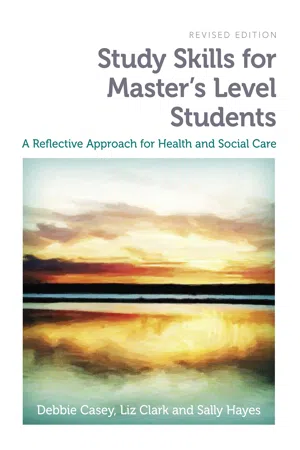
Study Skills for Master's Level Students, revised edition
A Reflective Approach for Health and Social Care
- 168 pages
- English
- ePUB (mobile friendly)
- Available on iOS & Android
Study Skills for Master's Level Students, revised edition
A Reflective Approach for Health and Social Care
About This Book
From reviews:
"...There are good sections on writing academically at master's level, how to get published and the benefits for postgraduates and the profession of sharing work. The authors conclude with a useful chapter on applying postgraduate skills in the workplace.
This excellent guide will also be an invaluable resource in areas of study other than the intended health and social care field."
Nursing Standard, Nov 13–19, 2013
This revised and updated edition of Study Skills for Master's LevelStudents adopts a reflective approach using exercises that are relatedto the development of the skills required to make the transition fromundergraduate to postgraduate thinking and writing. Questions and activitiesencourage students to identify the skills that the postgraduate student shouldpossess and to demonstrate an understanding of how those skills are developed.
Topics coveredinclude:
* Critical thinking
* Developing independent study skills
* Finding and using literature
* Applying postgraduate skills in the workplace
* Writing at Master's level
* How to get published.
The book is easy to use and jargon-free with clearly definedlearning goals. Reflection points are included in order to support independentlearning and enquiry, and there are also suggestions for additional readingthroughout the book. Study Skills for Master's Level Students can therefore be used as an independent student study tool or by lecturers inworkshop settings.
Here's what lecturers thought of the first edition:
"Avery comprehensive and accessible guide which is contemporary and related toapplication within the workplace."
"Easyto read and well presented."
"Veryuseful; activities excellent."
"Ithought the complete book is a must for all postgraduate students."
"Thisbook is excellent and I wish I had had a chance to read [it] pre my MSc course."
Frequently asked questions
Information
• | the opportunities that Master’s level study offers students; | |
• | consideration of the issues Master’s level students face during their studies; | |
• | types of Master’s level courses; | |
• | the difference between Bachelor’s and Master’s level study and outcomes; | |
• | the regulation of higher education and the role of the Quality Assurance Agency for Higher Education (QAA); | |
• | types of content, structure and delivery; | |
• | the types of assessment, learning and teaching students may experience. | |
• | By the end of this chapter you should be able to: | |
• | understand the different types of Master’s courses available; | |
• | explain the differences between Bachelor’s and Master’s level courses in terms of what is expected of you as the student; | |
• | describe the role of the QAA; | |
• | explain how Master’s courses may be structured and delivered; | |
• | describe the types of assessment, learning and teaching methods that you might encounter. |
1. | Focusing on a particular aspect of a broader subject area in which they have prior knowledge or experience, whether through previous study or employment. | |
2. | Focusing on a particular subject area or field of study in greater depth than they encountered during the course of previous study or expe... |
Table of contents
- Cover
- Title Page
- Copyright Page
- Contents
- Dedication
- Abbreviations
- Introduction
- 1 What is Masterly?
- 2 What is Critical Thinking?
- 3 Becoming an Independent Learner
- 4 Finding and Critiquing Literature
- 5 Writing at Master’s Level
- 6 How to get Published
- 7 Applying Postgraduate Knowledge and Skills in the Workplace
- References
- Index
- Back Cover